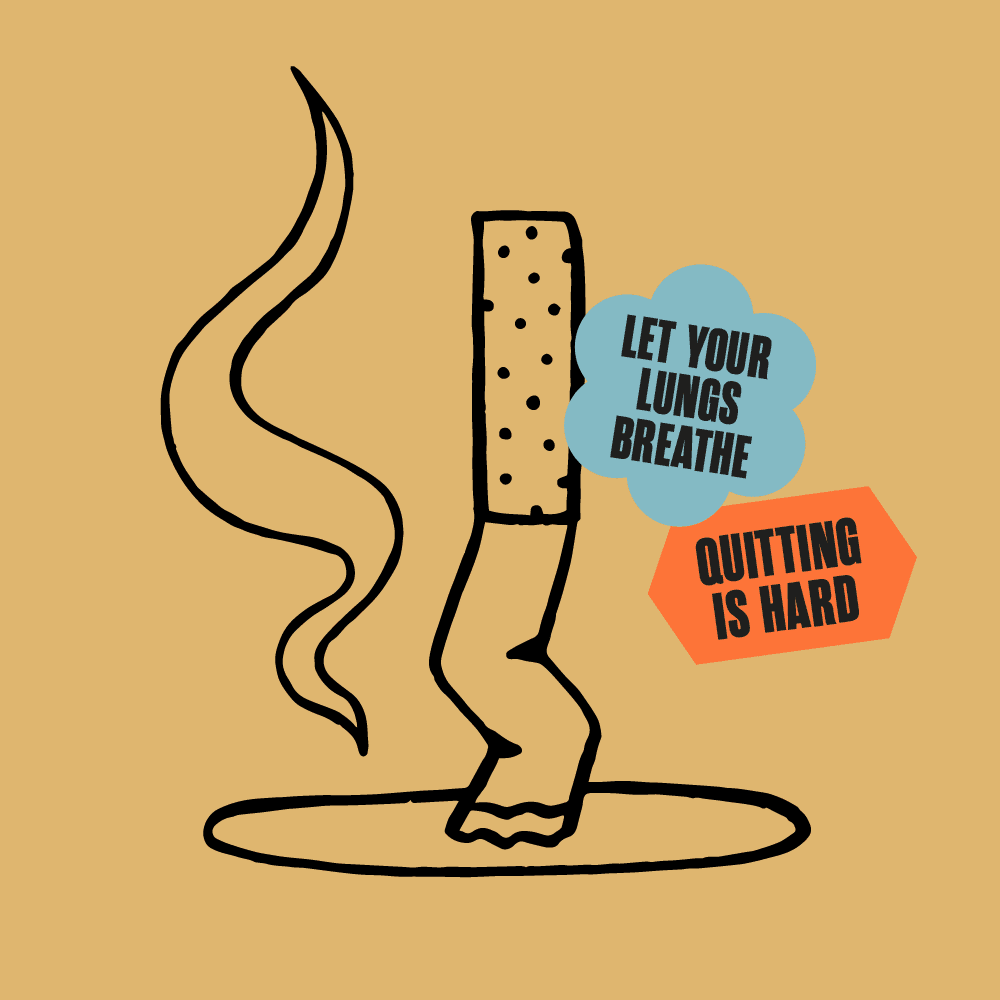A guide to
Quitting Smoking
Look at you, taking your health into your own hands by quitting smoking. It won’t be easy, but we swear it will be worth it.
Look at you, taking your health into your own hands by quitting smoking. It won’t be easy, but we swear it will be worth it.

Look, you’re going to experience nicotine withdrawal symptoms and it’s not going to be fun. While symptoms can feel different for each person, they’re usually uncomfortable and annoying. But, there are ways to make the process easier. Here are some things you can expect.

Since your body is addicted to nicotine, it’s normal to feel cravings or urges to smoke. Basically, your body is trying to scratch the nicotine itch.
Many people feel irritated, grouchy, or upset when they’re trying to quit smoking. It’s your body trying to recalibrate. Don’t be too hard on yourself if you’re more irritable than normal. Practicing mind over matter is no small feat.
Feeling jumpy or restless is basically your body’s version of being grumpy.
It can be harder to concentrate in the first few days after you quit and it can feel like all you’re thinking of is smoking. This will pass with time. Mind over matter, you got this.
It’s normal to have trouble sleeping as your body tries to readjust to not having nicotine. If lack of sleep is an ongoing issue you’re experiencing, talk to a doctor.
What you consume can be all consuming, but you’re doing the best you can. Make the choices that make sense for you and if you’re not sure, talk to your doctor.
Some people experience mood changes, including feeling anxious, sad, or depressed, for a short period of time after they quit smoking.

We all know that smoking isn’t good for us, but that doesn’t mean it’s easy to quit. If you’re ready to kick your nicotine habit, we’ve got you covered with these manageable tips and tricks.
Tell people in your life that you’re quitting so they can encourage you and hold you accountable when it gets hard. If you spend time with people who also smoke, ask them to support you by not smoking around you. A doctor can help you figure out the best plan for success.
Whether you’re a social smoker or a stressed-out smoker, understanding your triggers can help you avoid them while you quit smoking. We’re not saying that you should never be in a social setting or that you’ll never get stressed out again (we wish!), but understanding your triggers will allow you to be prepared to handle them in a different way that doesn’t rely on tobacco.
Your body is addicted to nicotine, which is part of why quitting smoking is so hard. To make it easier, try using a nicotine replacement option to satisfy the itch without the cancer-causing smoking. You can try:
Not literally, unless you have a cigarette can, then go ahead and kick that down the road because you won’t be needing it anymore! Tobacco cravings can be intense, but they usually only last 5-10 minutes. When you feel a craving coming on, try to delay the urge by distracting yourself, going to a smoke-free area so you couldn’t even smoke if you wanted to, or treating yourself to something else instead. Over time, you’ll be able to trick your brain to move past the craving.
A lot of people experience an oral fixation or addiction when they smoke cigarettes. Your body has become addicted to what it feels when your mouth is taking a drag. To satisfy this oral craving without giving in to tobacco, try chewing on something like gum, hard candy, carrots, nuts, or toothpicks.
Make sure that your environment is working with you, not against you. Get rid of all of the cigarettes, lighters/matches, and ashtrays in your home, car, and at work. Wash or get rid of your clothes, your bedding, and anything else that smells like smoke. This will help you get a fresh start and not be tempted.
It’s easy to think that if you have just one cigarette, you’ll be able to satisfy your craving and not fall off the wagon. Unfortunately, one usually leads to more and could land you right back where you started. Why do that to yourself? It’s better to avoid cigarettes altogether.
Moving your body can help distract you from your cravings, and even make tobacco cravings go away. Try joining an exercise group or going for a walk, run, bike, or swim at times when you’re most tempted. Even short bursts of activity can help, like running up and down the stairs or putting your headphones in and dancing around your living room like no one is watching.
Stress can be a double edged sword when it comes to quitting smoking. Many people smoke to deal with the stress in their lives, but quitting smoking can also be stressful. Try to manage your stress by meditating, taking deep breaths, listening to soothing music, or doing yoga.
You don’t have to do this alone. When you’re trying to resist a craving, call a friend or family member to talk it out and distract yourself. You can also try finding a support group or mental health professional. Or you can call 800-QUIT-NOW or text QUITNOW to 333888 to talk to someone, get resources, and make a quit plan you can stick to.
You’re special, but not that special. Many other people have gone through this before. Talk to friends or family members who have previously quit smoking or read strangers stories online to hear what their experience was like and get some encouragement.
Take some time to write down your relationship with smoking and tobacco. Why do you smoke? What are some alternatives you can do when you want to smoke? Most importantly – Why do you want to stop smoking? You may want to feel better, get healthier, protect your loved ones from secondhand smoke, or save money. No matter your personal reasons, writing these things down will allow you to go back and check in when times get hard.
Making a personalized Quit Plan can help you quit for good.
Sources: Centers for Disease Control & Prevention; Mayo Clinic
Cancer is hard. Visit our library to help navigate cancer’s impact on your heart, body, soul, and everything in between.